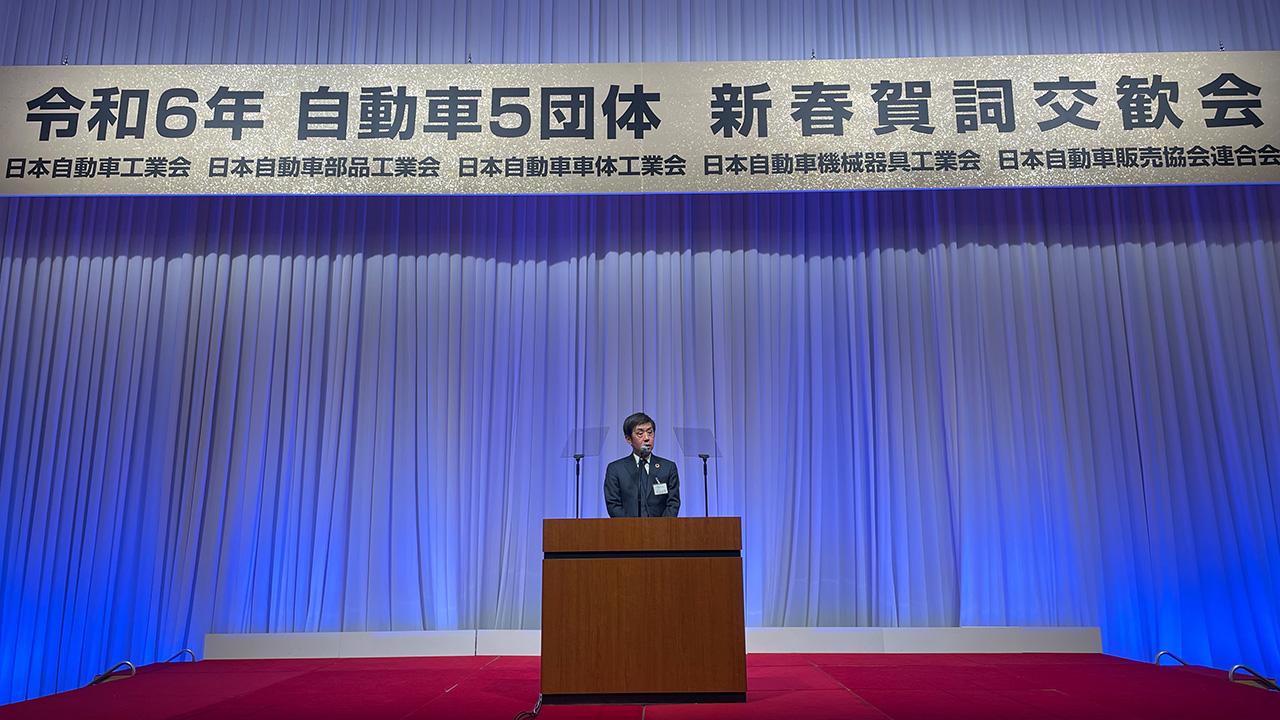
At the end of last year, the presidency of JAMA transitioned from Akio Toyoda to Masanori Katayama. This New Year's message highlights the united resolve to tackle challenges such as reconstruction from the Noto Peninsula Earthquake and the logistics issues of 2024.

On January 5, 2024, a New Year’s gathering was hosted in Tokyo by five major automotive organizations.*
*The Japan Automobile Manufacturers Association (JAMA), the Japan Auto Parts Industries Association (JAPIA), the Japan Auto-Body Industries Association (JABIA), the Japan Automotive Machinery & Tool Manufacturers Association (JAMTA), and the Japan Automobile Dealers Association (JADA).
In a significant leadership shift announced last November, Akio Toyoda, chairman of Toyota Motor Corporation, passed the baton to Isuzu Motors Chairman Masanori Katayama. The new team kicked off on the first day of the new year. On January 5, Katayama made his first public appearance and delivered an inaugural address. Following him, former Chairman Toyoda also took the stage.
Both leaders commenced their speeches by expressing condolences for those who lost their lives in the Noto Peninsula Earthquake. Toyoda emphasized his commitment, together with 5.5 million colleagues, to support the reconstruction of the affected areas.
In last November’s leadership change announcement, JAMA prioritized addressing challenges in the logistics and commercial sectors, starting with the pressing issues of 2024. Katayama expressed a strong determination to expand initiatives beyond the automotive industry with an all-Japan approach.
Following is the full text of the addresses delivered by both the outgoing and incoming chairmen.
The 2024 logistics problem is an urgent issue
New Chairman Katayama
Happy New Year! I am Masanori Katayama, the Chairman of JAMA.
First, I would like to extend my deepest condolences to the victims of the 2024 Noto Peninsula Earthquake and express my heartfelt sympathies to those affected.
I sincerely hope for the safety of everyone in the affected areas and pray for the swift recovery and reconstruction of these regions.
I am deeply grateful for the presence of many esteemed guests today, including Yoshida Nobuhiro, the Parliamentary Vice-Minister of Economy, Trade and Industry; and Tsuruta Hirohisa, the Director-General of the Ministry of Land, Infrastructure, Transport and Tourism’s Automobile and Logistics Bureau, despite their busy schedules.
On behalf of the five automotive associations, I am honored to extend New Year greetings to you all.
Reflecting on the past year, it feels like we have finally started to reclaim our normal social lives and economic activities from the grips of the COVID-19 pandemic.
We also saw an increase in the number of tourists and businesspeople from overseas, helping to create a renewed sense of vitality in Japan.
As we embark on a new year, I am grateful to be here with all of you and am determined to make 2024 one of even greater leaps forward for the automotive industry under united efforts.
I officially assumed the role of JAMA chairman on January 1 of this year.
Being at the helm during a period of once-in-a-century transformation, I am acutely aware of the heavy responsibility that comes with this position.
Today marks the beginning of a new era for JAMA under a new leadership structure. Building on the foundation laid by former Chairman Toyoda, we aim to evolve our team-based approach to problem-solving. I am determined to work closely with the vice-chairmen and directors to overcome the challenges ahead with full cooperation and effort.
We are confronted with a diverse array of challenges. However, to ensure that the automotive and mobility sectors continue to be key contributors to the Japanese economy, we have identified specific actions to be undertaken within the next two years. These have been compiled into seven primary issues, as has been previously communicated.
Among these, responding to the anticipated logistics stagnation in 2024 is an urgent social issue.
We plan to go beyond the automotive industry and foster collaboration with other sectors. Among our planned initiatives, we will actively adopt autonomous driving technologies and further optimize our operation systems.
In our pursuit of carbon neutrality, we have been advocating for a multi-pathway approach, emphasizing that “the enemy is carbon, not the internal combustion engine.” This approach underscores the need to promote a diverse range of technologies.
While the expansion of electrified vehicles necessitates the development of essential infrastructure and supporting policies, we see this as an opportunity for a major transformation in the mobility industry. We intend to increase our investment in research and development and to explore new markets, all aimed at enhancing our competitiveness.
Moreover, we are fully committed to addressing challenges such as securing international competitiveness for domestic batteries and semiconductors, developing competitive clean energy solutions, and facilitating cross-industry data collaboration.
Last fall, we hosted the Japan Mobility Show.
This event, bringing together over 500 companies and organizations, was a step towards realizing a mobility society where cars evolve into mobility, creating new values.
The show attracted 1.11 million visitors, highlighting the public’s expectations and the potential of the mobility industry.
I extend my heartfelt thanks to everyone involved in making this event a success.
And today, as a special request from me, we are honored to have with us former Chairman Toyoda, who played a leading role in the success of the Japan Mobility Show.
I would like to express my deepest gratitude to Mr. Toyoda for his long-term commitment to JAMA and, in recent years, for his strong leadership in implementing reforms.
I would now like to pass the microphone to him and invite him to share his thoughts.

